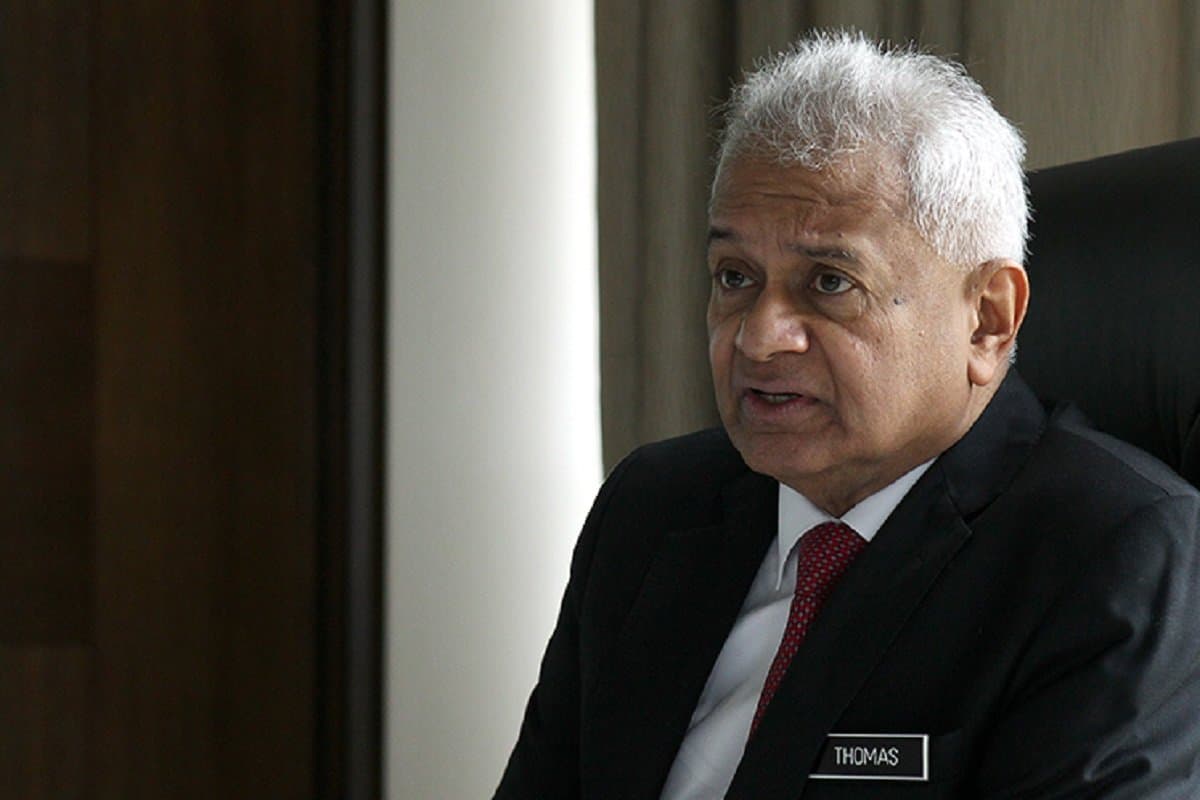
KUALA LUMPUR (Nov 16): Tan Sri Tommy Thomas, who is known among the legal fraternity as a constitutional and commercial barrister, said his 20 months' stint holding the highest legal office in the land has changed his views on politics.
“It was much more worse than I thought. Politicians have their own code,” he said in response to questions from lawyers Gopal Sreenevasan and Razlan Hadri Zulkifli on their show Advocates: The Podcast.
Thomas said being a constitutional lawyer, and having a Masters in International Relations, he was interested in politics. However, he did not discuss the topic when in meetings with Cabinet members.
“I am conscious of my role to advise the government. I hardly talked about politics with them, although I had known them previously,” he said.
Thomas said he was glad that the legislature supported the change in lowering the voting age, and credited its success to then youth and sports minister Syed Saddiq Syed Abdul Rahman. The ex-attorney-general (AG) noted that this was one of the few constitutional changes supported by both the government and the then opposition.
“I also wanted to move on to a two-term limit for the PM (prime minister). This bill was one of the promises made [by the previous government] and we wanted to table it this June (2020),” he said.
Thomas said he is also supportive of separating the AG's office with that of the public prosecutor.
“I was, however, not involved in the discussions. The meeting on this matter was handled by the solicitor-general and she oversaw it, [but] I did give some advice,” he added.
Thomas said during his tenure as the AG, he set out on three missions, namely to deal with matters relating to 1Malaysia Development Bhd (1MDB), to deal with allegedly lopsided contracts by the previous Barisan Nasional (BN)-led government, and undertake legal reform.
He saw graft charges being brought against ex-premier Datuk Seri Najib Razak in relation to 1MDB and its funds, and was involved in negotiating some of the deals.
The deals included the International Petroleum Investment Company (IPIC)-1MDB arbitration and the East Coast Rail Link (ECRL), and beginning the talks for a settlement with Goldman Sachs.
Anti-hopping law?
Thomas said in the mid-1990s, he believed that political solutions should be formulated to combat party-hopping by elected representatives. However, now he feels that legislation is needed to overcome this practice.
He admitted that the previous Pakatan Harapan (PH) government did not push for an anti-hopping law, but understands that there are daunting challenges in formulating such a law, citing the Datuk Nordin Salleh case used as a precedent in arguing for the rights to association as guaranteed under Article 10 of the Federal Constitution.
“The minister tabling the bill [on anti-hopping], if Malaysia is going down this road, may have to face problems. The minister must express the intention of tabling the bill.
“However, right away after the tabling of such a bill, its constitutionality would be challenged as it [would overrule] the Nordin Salleh decision by the Supreme Court,” he said.
The Nordin Salleh case follows the defection of Nordin and Wan Mohamed Najib Wan Mohamaed, two then Parti Semangat 46 elected representatives, to Umno in 1991. The Kelantan government then passed a law in 1992 against party-hopping and tried to apply it retrospectively in 1990.
The duo's seats were declared vacant and they contested for the seats again, but lost in the by-elections. They legally challenged the vacancy declaration and the Supreme Court then ruled that the amendment to the state constitution breached Article 10 of the Federal Constitution, which guarantees freedom of association.
Thomas said the previous PH government viewed that there was no need to press ahead with an anti-hopping law, but he acknowledged that following the change in the federal government in February, there were renewed calls for having such a law.
Writing memoirs
Thomas said he had a chance to oversee the first of Najib's 1MDB related cases, namely the SRC International Sdn Bhd trial, which began in April 2019.
The former AG admitted that he was concerned about letting that trial go on without him at the helm.
“I was afraid [in] midstream as submissions for the SRC [case] were due in May when I already left, and there were plenty of things left in the air due to Covid-19,” he said.
Since resigning as the AG in February, Thomas said he had been “lazy doing nothing” but is working on his memoirs.
He already authored two books, titled Abuse of Power and Anything but the Law.
Another book is scheduled to be released next month, titled Justice in the Wilderness, which he wrote during the lockdown period.
In it, he discusses more than 40 years as a barrister, starting off at Skrine, before setting up his own firm and eventually becoming the AG.
The podcast also discusses his experiences with some well-known judges of the past like the late Tan Sri Eusoffe Abdoolcader and how he, along with the late Raja Abdul Aziz Raja Addruse, represented former Lord President Tun Salleh Abas in the 1988 Malaysian Constitutional crisis.
Advocates: The Podcast's interview with Thomas is the first in a series of podcasts with legal luminaries. In early December, it will air an interview with one of US President Donald Trump's lawyers, namely Alan Dershowitz.